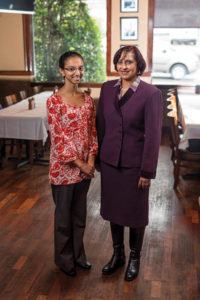By Rebecca Jensen

Rohini Chakravarthy (left) is earning a joint MBA/M.D. degree from Vanderbilt, supported by a scholarship established by Dr. Reita Nirankari Agarwal, EMBA’06. Photo by John Russell.
Rohini Chakravarthy was only 17 years old when she had her first epiphany. An undergraduate at Johns Hopkins with an eye on medical school, Chakravarthy was volunteering for an organization that connects patients with nonmedical resources: healthy food, transportation and insurance benefits.
“One of the very first patients I saw was a 17-year-old girl just like me,” Chakravarthy says. “We were wearing the same shoes. We listened to the same music. But she had grown up in poverty. She didn’t have access to health insurance or a good education. I had the complete opposite experience. It felt unfair. Because we were born in different ZIP codes, we had completely different lives.”
Today, Chakravarthy is working to close this gap. As a dual MBA/M.D. candidate, she is looking to take a fresh approach to solving health care challenges by incorporating both medical and business perspectives.
At Vanderbilt, she is part of a student-run interprofessional hot-spotting group. Hot-spotting is a health care advocacy model focused on patients who are high users of health care resources that looks for the causes behind that usage and pinpoints major barriers to optimal care.
“We have a small cohort of patients that we have been following who collectively have millions of dollars of hospital admissions,” Chakravarthy says. “For example, the most recent patient I visited has had 30 visits to the emergency department in the past six months. Last week we identified that there was a misunderstanding about how he should be taking his newly prescribed medication. He’s also been having trouble communicating with his mental health provider, so we’ve been able to facilitate that.”
More than anything, though, Chakravarthy is interested in finding business solutions to address the complex social determinants of health. After completing three years of her medical education at Vanderbilt, she is focusing on her MBA training this year. Her final year will be split between her medical and business education.
“I’m passionate about this training because it’s going to be the best way to convince other stakeholders—payers, providers—that there are solutions that benefit both the patients and the business. If you can speak both languages, which I’ve already started to learn how to do, there’s a huge benefit,” says Chakravarthy.
In part, Chakravarthy’s ambition and drive is made possible by the Reita Nirankari Agarwal Endowed Scholarship, established by Dr. Reita Nirankari Agarwal, EMBA’06, an internist in Murfreesboro, Tennessee.
“When I found out about my financial aid package, including Dr. Agarwal’s scholarship, it was a huge sigh of relief. I wouldn’t be responsible for two tuitions in one year,” Chakravarthy says. “Otherwise, I don’t know if I would have done both degrees at the same time. Now that I’ve started at Owen, I’m seeing how much benefit the MBA training is providing me now, as opposed to later in my career. I’m already more confident explaining my interests. I’ve gotten a lot of exposure to different ways I could make an impact in the future, through consulting, insurance or even electronic health records.”
These lessons are precisely what Agarwal had in mind when she created the scholarship in 2014.
“I wanted to send a message with this scholarship,” Agarwal says. “Medical students need to understand that the business side of health care is important. How are our future physicians going to manage the high cost and low outcomes of our health care system? It’s not even enough to understand the health care business. You need to understand business in general. You have to step out of your comfort zone. That’s how you innovate.”
Her scholarship is also rooted in her experience as a physician with a business background. But more than that, Agarwal comes from a long tradition of giving back to the world.
Born in India and raised in Kuwait, Agarwal saw firsthand the highs and lows of people’s lives from a diverse and multicultural perspective. As members of the spiritual movement Sant Nirankari Mission or Universal Brotherhood Mission, her family prioritized serving the community in which they lived.
“I grew up serving the poor people who had been misused by society,” she says.
“Because of our mission, my father prioritized oneness, treating everyone with love and care. It doesn’t matter if they are your relative or not. If you see something, do what you can. That’s how I was raised.”
It’s easy to draw the line between her family’s culture of service to Agarwal’s current life as a physician and philanthropist. But she is quick to complicate that assumption.
“It’s my father’s legacy in some way or my mission’s legacy, but really I believe it should be every human’s legacy,” she says. “That’s what humans are about—to live for the greater good. Your good is nothing without the greater good.”
This fall, Agarwal and Chakravarthy had the opportunity to meet. “Rohini is delightful,” Agarwal says. “She is the perfect recipient for this scholarship and has clearly been dedicated to important health care issues for some time. She may be only a drop in the ocean, but every drop makes the ocean. When you put them all together, that’s how you make change happen.”
Scholarship support is a key priority for the Owen Graduate School of Management. Today, only a third of the school’s scholarships are funded through endowment. For more information on creating scholarships, contact Erik Kahill at erik.d.kahill@vanderbilt.edu or 615/343-4072.